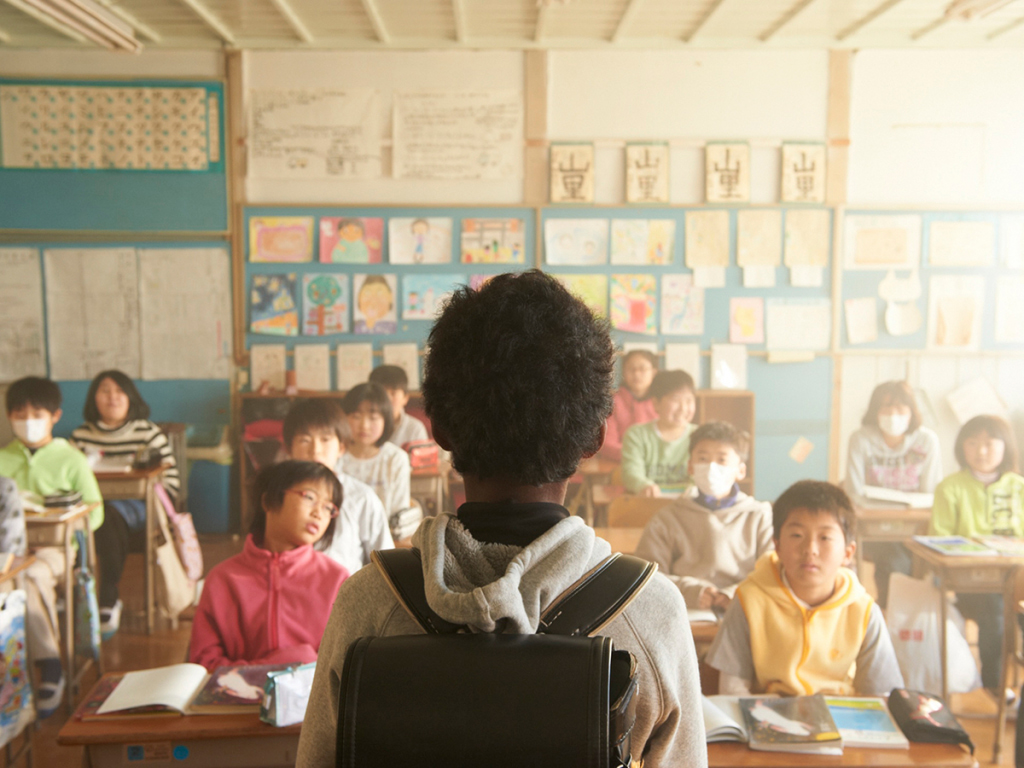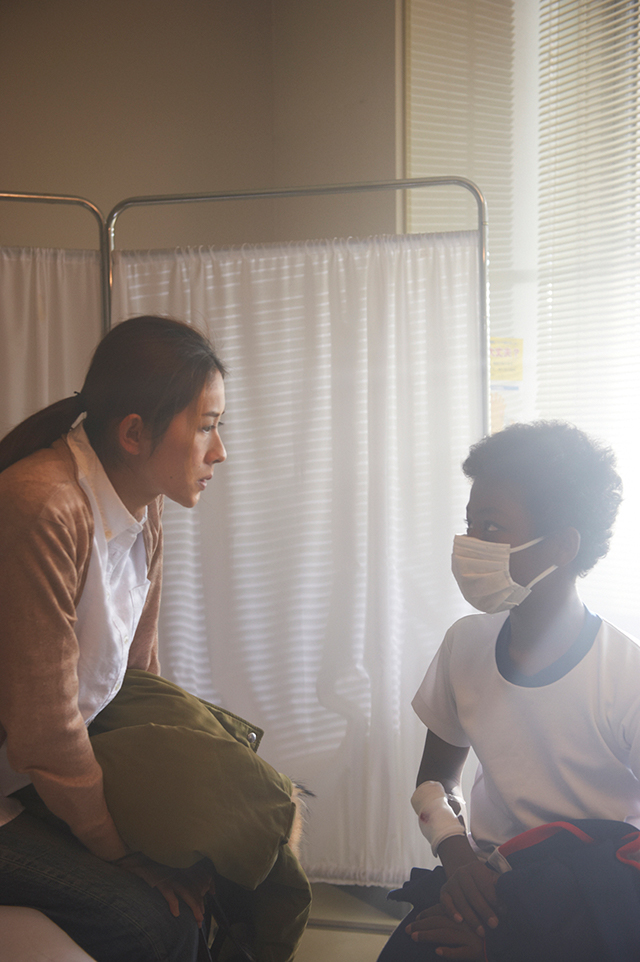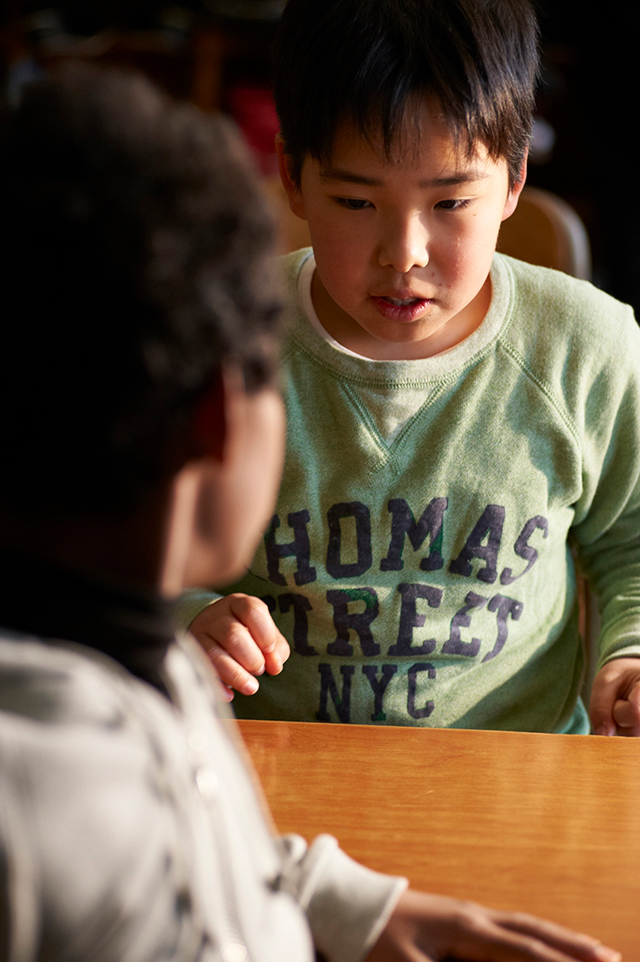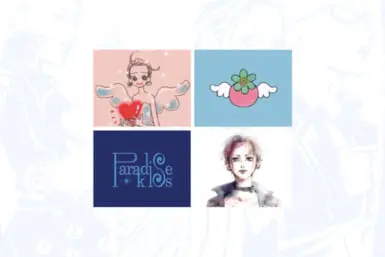There’s a contagious problem that permeates Japan. Unlike an actual virus, it can’t be transmitted through touch, sex, blood or other bodily fluids. It’s not genetic, but learned. At an early age, Japanese children contract it from parents, teachers, and the Western media. On the humanitarian spectrum, this disease-like problem ranges from bullying and xenophobia to racism. In American filmmaker Emmanuel Osei-Kuffour’s award-winning short film, Born With It, the problem and its remedy are analogous to a class of all-Japanese students and how they relate to their African-Japanese schoolmate.
The main character is a six-year-old boy named Keisuke (played by Dadie Takagasugi). He and his single Japanese mother just moved to a small countryside town. On Keisuke’s first day at his new elementary school, he stands in the hallway staring at class pictures. Light and shadow stripe his coffee-colored hand as he compares it to the white faces peering at him. While introducing himself to his class, a kid asks him why he can speak Japanese. “Because I am Japanese,” Keisuke says. The class collectively reacts with a confused sound equivalent to a question mark. Because of his dark skin, kids openly suspect that he has HIV/AIDS.
Director Emmanuel Osei-Kuffour explains that the story “germinated” out of his experience when attending grad school at New York University’s Tisch Asia in Singapore. It became his film thesis. “Like Japan, Singapore is an island nation, so there’s a lot of stereotyping and xenophobia there. I remember for the first time in Asia feeling a lot of racism because of my dark skin … It was just constant negative perceptions that I would experience with people there,” says Osei-Kuffour. Born was originally supposed to be shot and culturally embedded in Singapore. But studying in Japan as an undergrad and interning at animation company Production I.G (which co-produced Ghost in the Shell) inspired him to shoot the feature here instead. Consulting some of his half-Japanese, half-black friends helped him adapt the film for Japan and keep the script grounded in truth. “I talked to one guy whose mom never told him that he had a black father [who was absent from his life]. He always thought that he was just slightly darker skinned than his peers, but that he was full Japanese. But as he started to grow, his skin started to get a little darker and he would try to scrub it off. His mom finally admitted that he had a black father.”
Another friend told him about growing up in Japan in the 90s, when a fear of transmitting HIV/AIDS was peaking. At the time, the spread of the disease in Africa was well known. Famed basketball player Magic Johnson contracted the HIV virus and announced his retirement. Osei-Kuffour says his friend recalled that “people would not want to drink from the same water fountain as him because they thought he had AIDS.” Osei-Kuffour had already written Born’s HIV/AIDS storyline prior to hearing his friend’s story. He said that even though “the original idea for the film was based upon my experiences in Singapore, I felt like it was very translatable and in many ways more effective because in Japan there are [mixed race] Japanese people who are culturally Japanese, have never lived anywhere else in their life, and don’t speak any English. But they’re not accepted by their own people. So I just thought that would be a little bit more traumatic and heartbreaking.”
Initially, since he regularly saw mixed race kids around Tokyo, he thought it’d be easy to cast the lead role of Keisuke. But parents of multiracial children were “opposed to telling this kind of story because they felt like it would scar their kid,” says Osei-Kuffour. The children’s parents wanted to protect them from being exposed to a side of Japan of which they were presumably unaware. “[The parents] were really nervous about the subject matter. And granted, I didn’t show them the full script. I just told them what it was about and the meaning of the film.”
Dadie Takagasugi, whom Osei-Kuffour thinks was initially a bit reluctant to play Keisuke, took the part. “I think his mom and dad wanted him to be in the film more than he wanted to be in it,” says the director. Dadie’s mother is Japanese and his father Ghanaian. Osei-Kuffour credits Dadie’s mother for helping to motivate her son’s performance. She was very vocal, but not critical of the project. “Dadie was probably the best child that I could’ve found,” says Osei-Kuffour. One of Born’s producers, Misu Kaoru, discovered Dadie through a talent agency. Over email she told TW that Dadie was “more curious about acting than he was scared.” He had never done it before. Modeling for print ads was the extent of experience he had performing in front of a camera.
When Dadie auditioned, Osei-Kuffour says he was, compared to other kids, “by far the most natural, and he seemed to resonate with the character [Keisuke] … I didn’t know if he’d gone through bullying, but his performances had an underlined pain. He was a very confident kid, but you could sense that he had experienced some of the events in the film.” On screen, when a Japanese student says that Keisuke has HIV/AIDS, Keisuke quickly turns to him, “AIDS? I bet you’re the one that has it.” It’s a subtle but poignant scene showing the remedy’s tolerance to the problem. Kids like Keisuke deal with this daily.
Watching the film made it impossible for me not to relate it to my own four-year-old daughter, Kantra. She’s African-American-Japanese, a double hyphenated panacea that fights the same affliction, which has become familiar to her with experience. As she gets older, she’ll eventually have to face it alone. “Believe in yourself. Don’t rely on other people to do it for you,” I tell her. “Mommy and Daddy won’t be here forever.”
Through email, I asked the director why none of the film’s characters stood up for Keisuke. “I chose to isolate him so that his end self-realization felt earned,” Osei-Kuffour replied. “This film was really about [Keisuke’s] need to accept himself.”
In this helicopter-parenting era, I would just as soon safeguard my child from the infected. But for my own daughter to survive, she must, like Keisuke, be exposed to develop a resistance. Eradicating this cultural problem depends on an individual’s core beliefs, no matter the judgment of others. Only the value that one places upon one’s self can vaccinate the threat of such a sickness. Born With It is symbolic of a cure for the afflicted, a remedy that doesn’t come from without, but from within.
More info about the film at www.facebook.com/BornWithIt. More info about Emmanuel Osei-Kuffour at www.emmanuelok.com/about. Born With It has been touring film festivals and winning awards since its original release in 2015, and was screened on PBS in May 2018.
[UPDATE] “BORN WITH IT” IS NOW AVAILABLE TO WATCH ON YOUTUBE:











